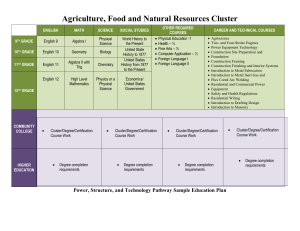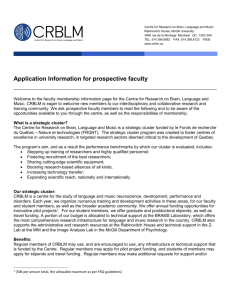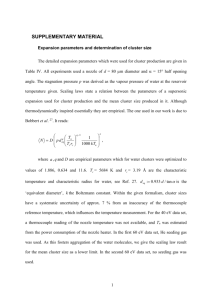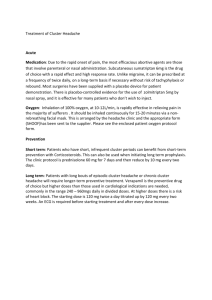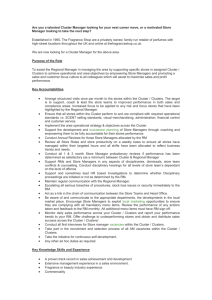education_cluster_meeting_minutes_2015-04
advertisement
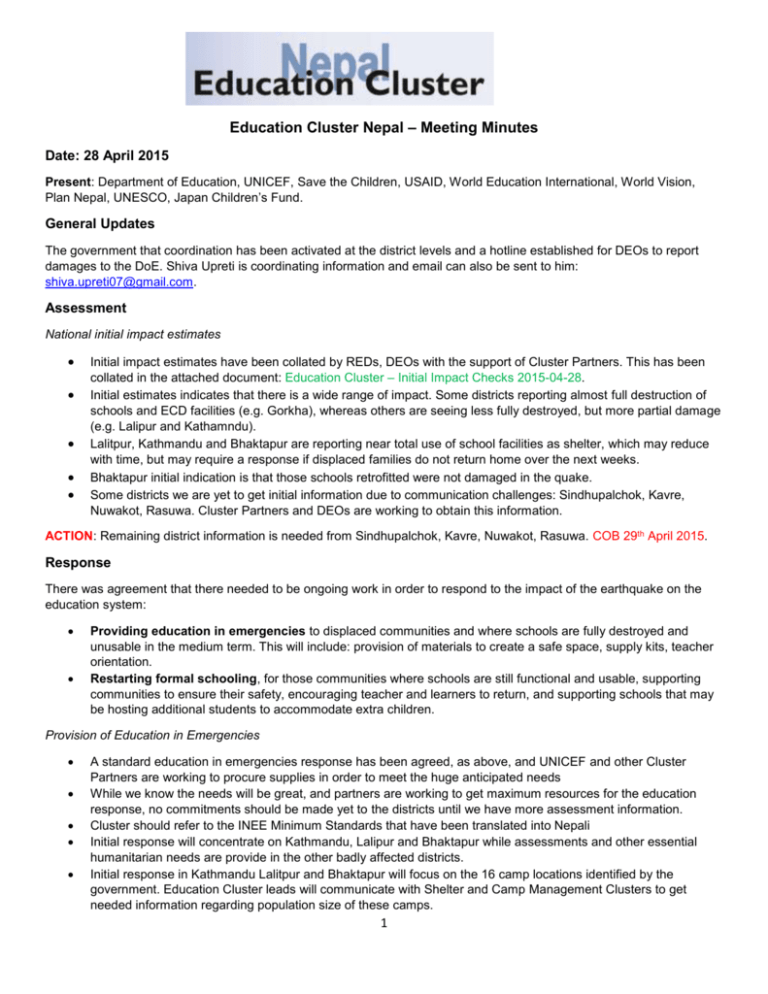
Education Cluster Nepal – Meeting Minutes Date: 28 April 2015 Present: Department of Education, UNICEF, Save the Children, USAID, World Education International, World Vision, Plan Nepal, UNESCO, Japan Children’s Fund. General Updates The government that coordination has been activated at the district levels and a hotline established for DEOs to report damages to the DoE. Shiva Upreti is coordinating information and email can also be sent to him: shiva.upreti07@gmail.com. Assessment National initial impact estimates Initial impact estimates have been collated by REDs, DEOs with the support of Cluster Partners. This has been collated in the attached document: Education Cluster – Initial Impact Checks 2015-04-28. Initial estimates indicates that there is a wide range of impact. Some districts reporting almost full destruction of schools and ECD facilities (e.g. Gorkha), whereas others are seeing less fully destroyed, but more partial damage (e.g. Lalipur and Kathamndu). Lalitpur, Kathmandu and Bhaktapur are reporting near total use of school facilities as shelter, which may reduce with time, but may require a response if displaced families do not return home over the next weeks. Bhaktapur initial indication is that those schools retrofitted were not damaged in the quake. Some districts we are yet to get initial information due to communication challenges: Sindhupalchok, Kavre, Nuwakot, Rasuwa. Cluster Partners and DEOs are working to obtain this information. ACTION: Remaining district information is needed from Sindhupalchok, Kavre, Nuwakot, Rasuwa. COB 29th April 2015. Response There was agreement that there needed to be ongoing work in order to respond to the impact of the earthquake on the education system: Providing education in emergencies to displaced communities and where schools are fully destroyed and unusable in the medium term. This will include: provision of materials to create a safe space, supply kits, teacher orientation. Restarting formal schooling, for those communities where schools are still functional and usable, supporting communities to ensure their safety, encouraging teacher and learners to return, and supporting schools that may be hosting additional students to accommodate extra children. Provision of Education in Emergencies A standard education in emergencies response has been agreed, as above, and UNICEF and other Cluster Partners are working to procure supplies in order to meet the huge anticipated needs While we know the needs will be great, and partners are working to get maximum resources for the education response, no commitments should be made yet to the districts until we have more assessment information. Cluster should refer to the INEE Minimum Standards that have been translated into Nepali Initial response will concentrate on Kathmandu, Lalipur and Bhaktapur while assessments and other essential humanitarian needs are provide in the other badly affected districts. Initial response in Kathmandu Lalitpur and Bhaktapur will focus on the 16 camp locations identified by the government. Education Cluster leads will communicate with Shelter and Camp Management Clusters to get needed information regarding population size of these camps. 1 Coordination with the Protection Cluster to establish safe spaces for children by setting up tents in the camps, supply some basic recreational materials, identify teachers or volunteer facilitators that are staying in the camps and orient them on psychosocial and live-saving messages will be drafted by the Protection and Education Clusters jointly. ACTION: UNICEF working on procurement of supplies ACTION: Cluster Partners and DEOs from the valley to attend tomorrows joint Cluster meeting with Protection to plan for the emergency response in the camps. 29th April, 11am. Restarting formal schooling For those schools that are not badly damaged, it will be important to restart schooling as soon as possible in order to provide some normalcy and routine for affected children. Currently, schools have been closed for 1 week in the 11 most affected districts. It is likely that DDRCs will make decisions regarding the reopening of schools in their districts, but the DoE and DEOs should work to ensure that this is done according to some key guidance: o NSET to share guidance on how to determine level of damage of schools. This will initially be done by SMCs and RPs. o The DoE will send out a directive that if no damage is observed, schools must reopen. o If damage is observed, the sub engineers will be deployed to perform a technical follow-up assessment. o For the technical assessments, the government will deploy sub engineers from non-affected districts to support this to happen quickly. o A separate meeting to be held with PABSON to discuss the process for private schools. Essential that private schools follow same checks in order to ensure the safety of children. The meeting agreed to develop key messages for a back to school campaign. Education Cluster, government and C4D colleagues will work on this over the next week. ACTION: NSET to share structural assessment guidance 29th April. ACTION: The DoE will send out a directive that if no damage is observed, schools must reopen. And to provide process for checking structural safety if there is some partial damage. ACTION: DoE to make arrangements for sub-engineers to be deployed to affected districts ACTION: DoE to meet with PABSON to discuss process for private schools ACTION: Education Cluster to work with partners and C4D colleagues on Back to School Campaign and Key Messages Coordination District level coordination has been activated by the Government. DoE needs to ensure that DEO representatives are participating and active in the DDRC groups. For the national level, Save the Children has requested global capacity to support Information Management for the Education Cluster. Landon Newby is planning to arrive in Nepal next week, TBC. He will work closely with EMIS and other DoE colleagues to manage information for the cluster. Given logistical issues, for the time being National Education Cluster meetings will be hosted at UN House. Next meetings: 29th April, 11am, UNICEF, UN House – Meeting with Protection Cluster focused on valley emergency response (only DEO reps, DoE, and partners with capacity to respond in the valley to attend) 30th April, 11am, UNICEF, UN House – General National Education Cluster Nepal (all invited) 2
